Although the Connecticut River in the US and Cael Uisce on the River Erne near Belleek in Co Fermanagh are transatlantically separated, the descriptive names of both rivers are etymologically connected.
The Connecticut River derives from a Native American word, quinatucquet, which means “beside the long tidal river,” and, similarly, Cael Uisce on the River Erne translates from Gaelic to “the narrow water.”
Both mighty rivers meander through the heart of their ancient landscapes and enter their respective Atlantic estuaries. The Connecticut River greets the Long Island Sound between the towns of Old Saybrook and Old Lyme, while the River Erne winds around Belleek, crossing the bar to meet Donegal Bay between the coastal townlands of Ballymacaward, Ballyshannon and Finner, Bundoran.
These two monumental rivers are also the source for creating a special symbolic bridge for Connecticut native Michael Pagano, who cut through Fermanagh this past year to connect with his ancestral roots.
Historian Stephen Heron from the Belleek History Society put me in touch with Michael over the summer. For anyone wishing to begin their own genealogical journey of connecting with their Irish roots at home or abroad, Michael’s story is inspirational.
A former attorney, Michael’s passion for genealogy transpired unexpectedly.
He said: “Genealogy has been my hobby since I assisted my daughter in putting together a family tree for a school project in 2008.
"However, it was when I received my results from my first DNA test through AncestryDNA that I really started to get an appreciation for the value genealogy could deliver.”
With many branches and leaves in Michael’s family tree (on both his paternal and maternal sides), he cultivates the recorded seeds of his research and illuminates them by traveling to every branch and leaf on his family tree.
One of those arched branches that guided him towards following the rooted footsteps of his ancestors led him to the fair village of Belleek.
I asked Michael if it must have been surreal to stand on the same land as his ancestors such as in Belleek Pottery, St. Patrick's Church right by Hawthorn Row, the ancient Keenaghan Abbey and Druminillar the “Ridge of Plenty” by the historic River Erne.
Michael enthused, “At this point, I am addicted to visiting the towns of my ancestors. Travelling is always fun but when you visit a location that is tied to your ancestors there are just no words to adequately describe the feeling. Surreal is definitely a good start.
"Part of my commitment to building my family tree is to visit the towns of origin of my immigrant ancestors.”
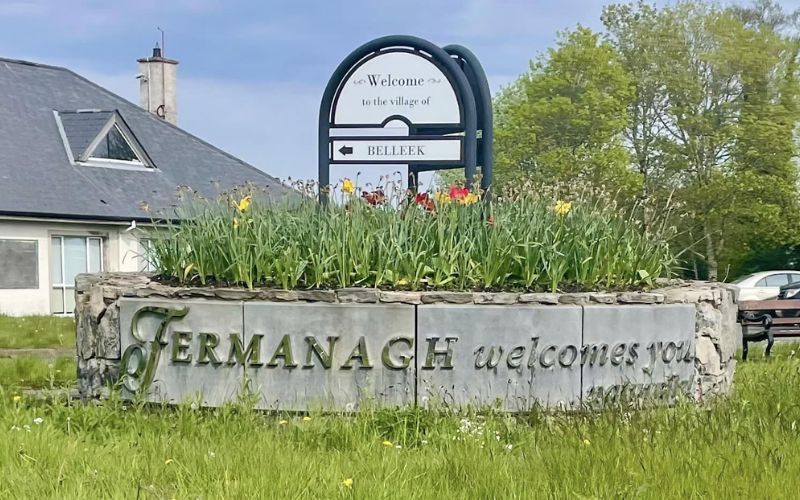
(Michael Pagano)
There were some question marks regarding Michael’s Slevin and Quinn ancestry since he knew very little from that side of his family growing up. The knowledge that was passed down to him was the names of James L. Slevin and his mother, Mary Quinn.
Michael pursued the paper trail left by his second-great granny, Annie Lipsett, formerly Slevin, nee Ennis, and his great granny Annie Slevin, the daughter of James L. Slevin and Annie. His great-grandad, James L., died, and Annie Ennis married James Lipsett.
Both Annies immigrated to the US, and their Scottish and Co Down records led Michael back to James L. Slevin and Mary Quinn in Belleek.
Michael recalled that “Annie Ellen Slevin and her husband Charles Gore lived in Middletown and Westbrook, Connecticut in the 1960s to 1980s. Middletown is right on the Connecticut River and Westbrook is on the Connecticut/Long Island Sound coast but also one town over from the mouth of the Connecticut River.”
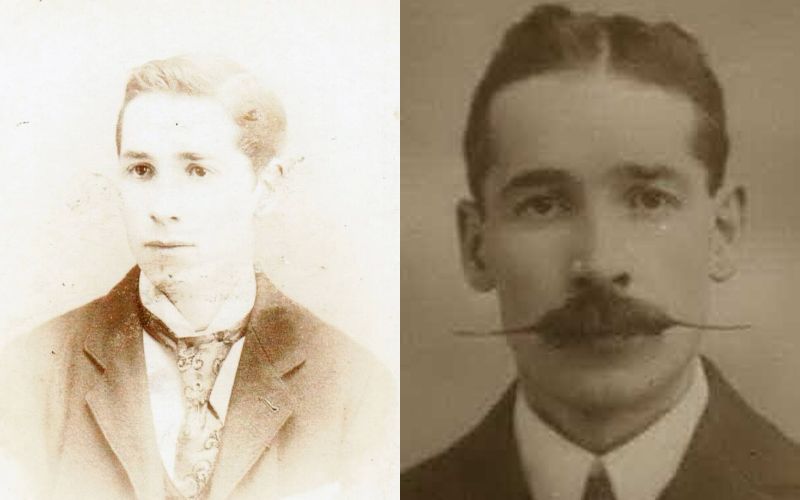
James Slevin Jr. (Michael Pagano)
The fate of Michael’s family that settled around the Connecticut River strikes an intriguing parallel with another distant river. After finding his Fermanagh family, Michael’s destiny was to travel to the ancestral homeland of the Slevins – Druminillar by Cael Uisce on the River Erne.
The first night of Michael’s arrival in the Belleek area, he said he "sat on Lough Erne watching the sunset and just thinking about how that was a routine everyday occurrence for my ancestors from the area. It was anything but routine for me.”
Michael acknowledged that “The kind folks at the Fermanagh Genealogy Centre put me in contact with a local author and historian Seamas Mac Annaidh who was nice enough to cart me all over the area, so I was able to visit Belleek town, Cloghore, Druminillar, etc.”
Michael was taken aback by the incredible sight of the pictures of Willie John Slevin (another son of James Jr. and Mary Quinn) and Jock Slevin hanging on the wall in Belleek Pottery.
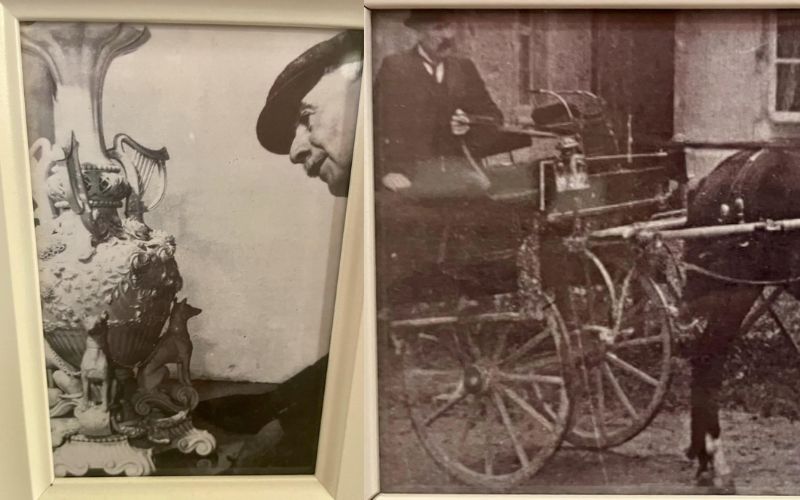
Willie John Slevin and Jock Slevin. (Michael Pagano)
Michael walked up Main Street to St. Patrick’s Church and “saw the headstone of James Jr. and Mary Quinn which also included all their children. A kind soul in the area had put that up in October 2023 on FindaGrave so I knew it was there. It was amazing to see it in person.”
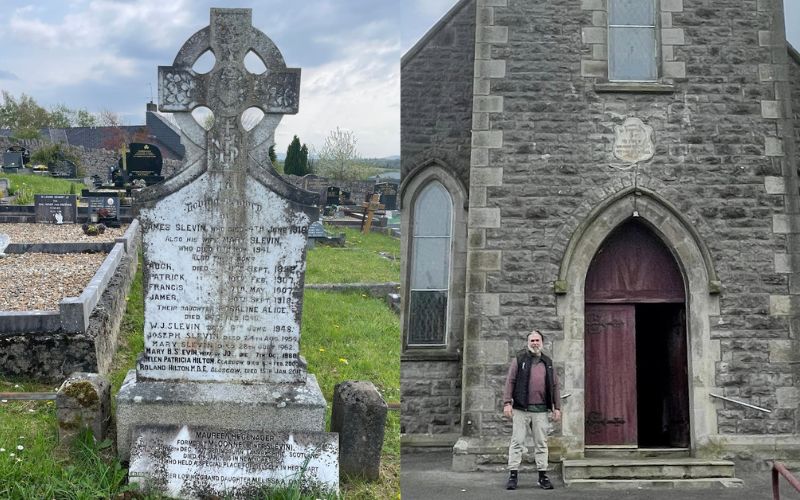
(Michael Pagano)
Michael then met Stephen Heron at Hawthorn Row across the road from St. Patrick’s church who “provided a great background of the area.”
Hawthorn Row is particularly important to Michael because “The only picture my mother had of Mary Quinn was her as a very elderly woman sitting on a chair in Belleek. After visiting Belleek, I now know that picture was taken in front of the house on Hawthorn Row. It was a wonderful experience to be able to stand in the spot in which she was sitting when that photo was taken.”
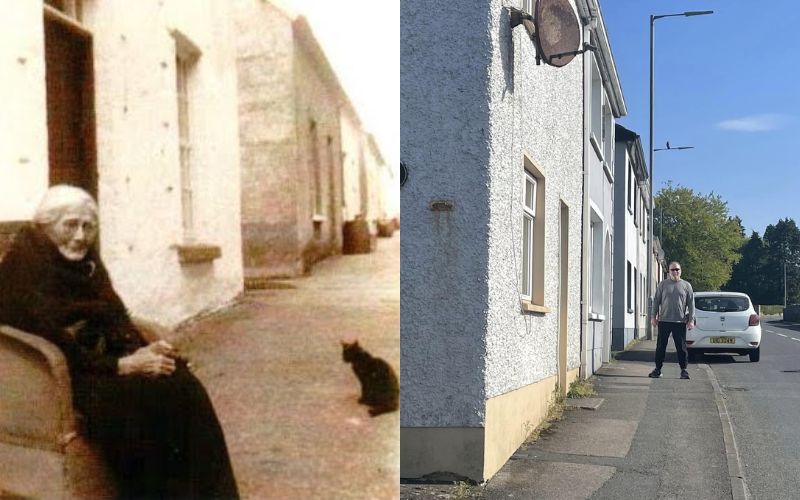
A sitting Mary Quinn and standing Michael in the same spot. (Michael Pagano)
Next stop for Stephen and Michael was to visit Keenaghan Abbey to pay respects to his ancestors that are buried in the revered graveyard such as the Fenian rebel, Patrick Slevin who died fighting for Ireland.
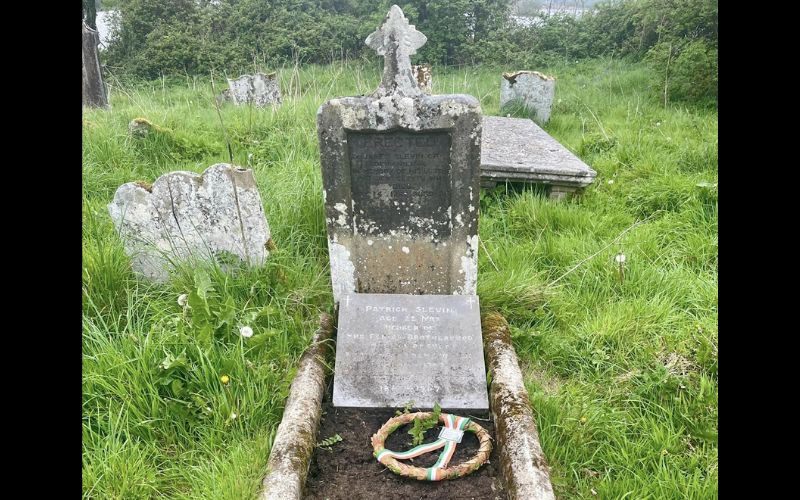
(Michael Pagano)
While Keenaghan Abbey and graveyard are protected for the time being by Fermanagh and Omagh District Council, an appeal process by the landowner is underway.
Michael’s journey of travelling the 6000 kilometres from the US to Belleek is yet another reason to support protecting Keenaghan and legally establishing the public right of way to the graveyard. Stephen Heron and the Belleek community are fighting for their families’ right to access Keenaghan Abbey so that they can pay their respects to the souls of their ancestors.
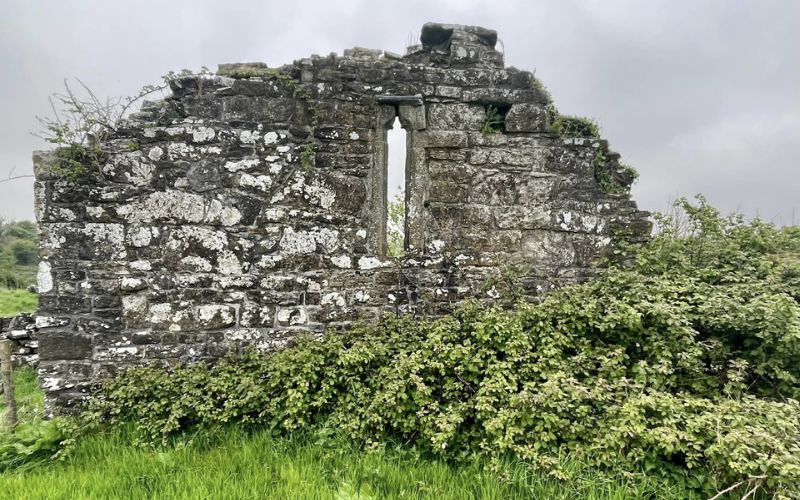
The striking candle-stone sculpted window of Keenaghan Abbey. (Michael Pagano)
One of Fermanagh’s oldest graveyards, Keenaghan‘s significance is like one skipping stone thrown across Keenaghan Lough – still rippling far beyond Fermanagh. Michael’s return is one such ripple along Ernian shores.
Nearby to Keenaghan Abbey that overlooks the lovely tranquil Keenaghan Lough and Keenaghan Cottage run by Lisa McWilliams, Stephen took Michael to the “historic Slevin property in Druminillar” which slopes down to Cael Uisce on the River Erne.
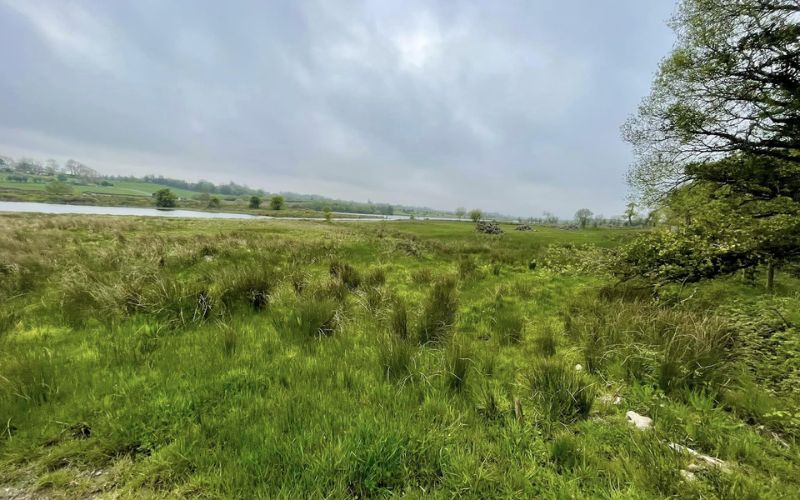
The historic Slevin lands in Druminillar “Ridge of Plenty” by Cael Uisce. (Michael Pagano)
Michael expressed: “My favourite part of the whole trip was visiting Pat and Betty Gilmurray and their daughters, Mary and Anne. Betty’s maiden name is Slevin so she’s the last Slevin still residing in the townland of Druminillar. We spent the evening drinking tea, eating tasty treats, and looking at pictures and genealogy charts. Experiences like that are what genealogy is really about.”
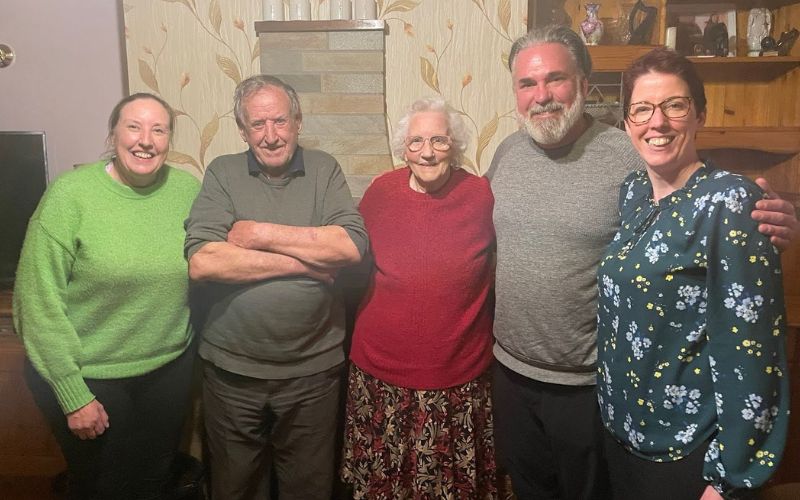
Michael’s visit with the Gilmurrays - Mary, Pat, Betty, Michael and Anne. (Michael Pagano)
Michael shared with me a classical quote from Cicero, the great Italian polymath that encompasses his genealogical philosophy. He chose this quote for his Ancestry profile page:
“To be ignorant of what occurred before you were born is to remain perpetually a child. For what is the worth of a human life unless it is woven into the life of our ancestors by the records of history?” -Marcus Tullius Cicero, 106-43 BCE.
This profound quote deeply resonates with Michael – from the coursing current of the Connecticut River where his family settled and where as a lad he did his fair share of fishing and boating to the ancestral streaming waters standing by the historic banks of Cael Uisce where Irish kings once gathered as a proud Slevin son.
Cicero would be proud of Michael, who also has deep familial ties to Italy since his life is inextricably linked with his forebears. Michael’s masterful research has finely woven the many threads of his life into the eternal garment of his ancestors.
While he and his wife soar around the world, enjoying the memorable sights of his ancestral travels, his home life is grounded with traditional family values as he delights “watching his adult children spread their wings.”
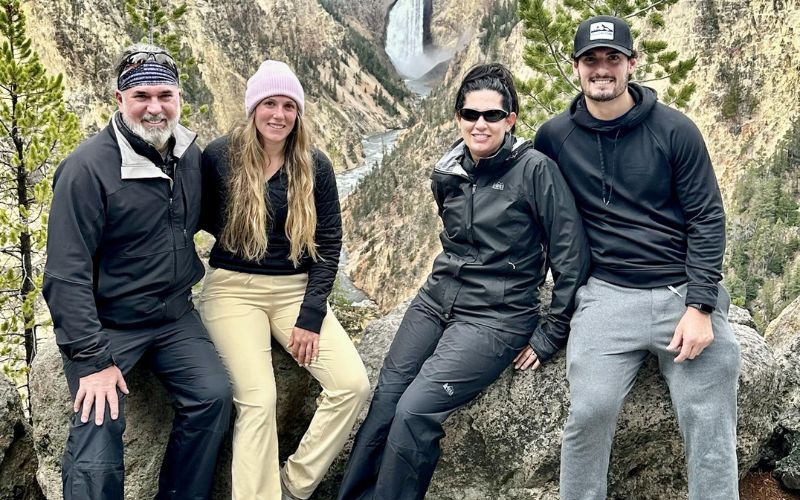
The Pagano clan. (Michael Pagano)
As both an Ó Sléibhín (Slevin) – descendent of “The Mountain” and an Ó Coinn (Quinn) – descendent of the “The Chief” – Michael looks forward to the future when he will show his grandchildren the mountain of his family research as the inspirational Chief of his Pagano clan.
A part of that epic Irish American journey – one of the wandering mountain trails that Michael first navigated – will be telling his grandchildren while they gather around their Granda – the ancestral story of how he built the transatlantic bridge – uniting the mighty river waters – from Connecticut to Cael Uisce.
*Eamon O'Caoineachan, originally from Co Donegal, received his Masters in Irish Studies at the University of St. Thomas in Houston and now works as a freelance writer and poet.
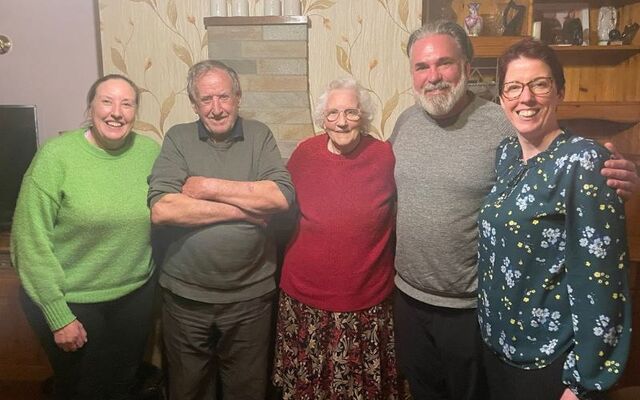



Comments